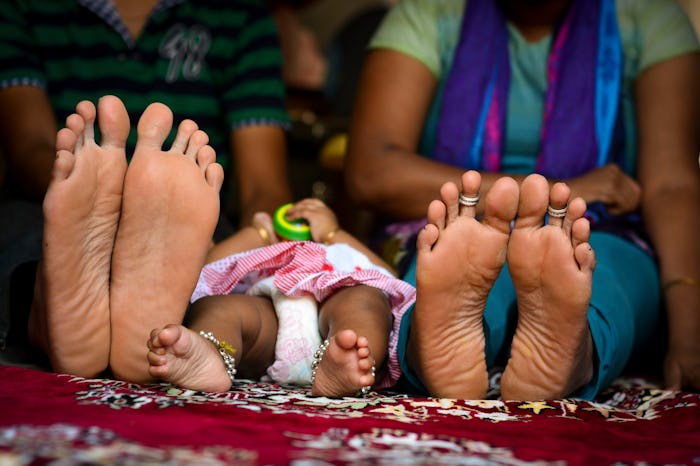Life
9 Reasons You Should Only Teach Your Kids The Proper Names For Their Body Parts
Very early in my first child's life, I added a new item to my list of things I didn't ever think about before becoming a parent: figuring out how to refer to my kid's genitals. It didn't take me long to realize that there are lots of reasons for teaching kids proper body part names, and so I committed to doing just that.
I will be the first to admit that it was hilarious and bizarre to hear my two-year-old daughter shouting "VAGIIIIINA" as she ran through the house. And my poor teenaged stepdaughter was pretty uncomfortable with that, at least for a while. But in all honesty, it felt really good to just normalize that word. It also helps me keep track of who's been talking to them about this part of their body, in a way that isn't how I talk to them, and that's incredibly important.
I don't remember what words I was taught for my genitals when I was growing up. I don't think my mom used euphemisms like "cookie"; maybe she used "privates," but the fact that I still squirm a little when I say "labia" and "vulva" indicate that they weren't words that were used very often.
I don't want my kids to squirm when they use the proper names for their body parts. They're just body parts, and no one should feel embarrassed for using the correct word. Here's why it's actually really important:
To Prevent Future Embarrassment
At some point in your child's life, they may refer to their "wee wo" around friends and face derision from them. I can (almost) guarantee they won't face that kind of derision for using the proper name, and if they do, then they can always lay a junior body-positive verbal smackdown on their classmates, and they'll be right.
To Get The Facts Straight
Do you really want your kid's health class to be where they learn the real names of body parts? It's really just one more way to make sure your kid is academically ahead of the game. You don't want them showing up to 6th-grade health class not knowing what a "testicle" is.
To Help Them Feel Comfortable With Their Bodies
The idea that accurate terms for body parts should be replaced with different words implies that something is wrong with those words — there isn't. It implies that those words are somehow "bad," and that's why children shouldn't use them. They're not bad, and they should use them.
Discouraging Sexual Predators
I'm sorry, it's a horrible topic that no parent wants to dwell on, but it needs to be said: Sexual predators are out there, and when kids are used to using the correct names for their genitalia, predators aren't given the opportunity to blur sexual boundaries with pet names for those body parts.
Catching Abuse Early
When your kid is more comfortable with their body, they're more likely to tell you that they're being sexually abused. They're also more likely to be understood by authorities because they're using actual terms, instead of euphemisms.
Confidence
The confidence that comes from knowing and understanding your body is priceless. The end.
Empowerment
When you know and understand and feel confident in your body, you don't need to rely on the approval of others. This is so important when it comes to being in situations where someone is trying to manipulate you. When you feel empowered, you're less likely to be manipulated into doing things you don't want to do.
Because Names Like "Cookie" Are Ridiculous
Do we call our elbows "arrows?" No. So why do we need to call other body parts by silly names?
It Might Be Good For You, Too
Maybe you need to normalize those words for yourself, as well? Teaching our kids is sometimes teaching ourselves, and there's nothing wrong with that.
